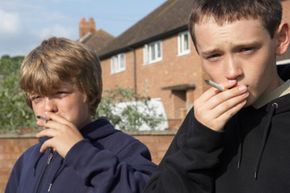 “A significant number of children try cigarettes in middle school.BananaStock/Thinkstock
“A significant number of children try cigarettes in middle school.BananaStock/Thinkstock
You’re well-aware of the serious health risks associated with cigarette smoking, including lung cancer, heart disease, emphysema, disability and premature death. You’ve also heard that smoking can be a steppingstone to the use of other drugs, such as marijuana or cocaine [source: Partnership for a Tobacco-Free Maine]. That’s why you definitely don’t want your kids to smoke, and you really don’t think they will.
While most parents share this optimism, contrary to their expectations, more than 2.8 million kids under the age of 18 are current tobacco users, and 400,000 youth become daily smokers each year in the United States [source: Riordan]. Most try their first cigarette between the ages of 11 and 13, although many start earlier. In a U.S. "Monitoring the Future" survey, 8.8 percent of eighth-grade students reported having first smoked by the fifth grade [source: Riordan].
Smoking is highly addictive, even more so than marijuana, alcohol or cocaine. Kids can become seriously addicted just days after first experimenting with tobacco products. And the earlier kids are when they first try cigarettes, the higher their chances of ultimately becoming a regular smoker, and the less likely they are to quit [source: Riordan].
So, how do you keep your kids from trying cigarettes? Whether you know it or not, as a parent, you are one of the greatest influences in your kids’ lives. The simple actions you take, such as sitting in a nonsmoking section of a restaurant, and not smoking yourself, have an impact. The negative attitude you have about smoking and the comments you make about cigarettes influence your kids. And the opinions you voice about tobacco companies to your friends and family also are important in molding your kids’ perspective. But, the best way to keep your kids from trying cigarettes is to stay connected. Click ahead to learn how.
How to Stay Connected With Your Kids
Spending time with your kids early on makes it easier to stay connected throughout their growing years. Your involvement guides them through life’s twists and turns and teaches them how to make tough decisions, like whether or not to try cigarettes.
Kids are less likely to smoke when parents are involved in their lives [source: Partnership for a Tobacco-Free Maine]. Staying connected provides opportunities for regular communication with your kids, creates an open family atmosphere where your kids feel comfortable discussing any topic and helps them learn to make good choices.
One way to stay connected is to plan time together. Block out time on your calendar for your kids and hold yourself to it. This simple action reinforces the message of how important your kids are to you and gives you the opportunity to talk about any topic, including the dangers of smoking.
Keeping a calendar of everyone’s appointments and activities helps a family feel more connected. You’ll see their extracurricular activities that you’ll want to attend [source: Riordan]. Plus, it enables you to plan family free-time activities.
While busy schedules don’t always allow it, eating meals together regularly is a great way to enjoy each other’s company. During this relaxing time you could discover if they are having any problems or need advice on handling a situation with their friends.
When you come home from work, tell your kids something about your day, particularly if it’s funny or unusual. Chances are, your kids will open up and tell you about their day too, what they did and the friends they spent time with.
When your kids talk, listen and ask questions. It shows you value their opinions and helps you understand their perspective. Make sure they feel comfortable talking about anything, including their opinions regarding smoking.
Setting boundaries for your kids gives them clear direction and makes them feel safe. Establish no-smoking rules for your house, and be sure to enforce them for everyone, including family members, guests and other visitors.
Giving your kids responsibilities, such as organizing the basement or caring for a pet, builds their self-esteem. It also makes them feel more "adult," which might alleviate their need to get that benefit from smoking.
You can’t protect your kids from all of the dangers in the world, but by staying connected, you can make a difference in whether or not they choose to smoke.
Lots More Information
Related Articles
- 10 Ways to Talk to Your Kids About Smoking
- Why is it so hard to quit smoking?
- Fact or Fiction: Kids and Smoking
- 10 Reasons People Start Smoking
Sources
- Partnership for a Tobacco-Free Maine. "Got A Minute?" (April 26, 2011) http://www.tobaccofreemaine.org/channels/parents/got_a_minute.php
- Partnership for a Tobacco-Free Maine. "Talk About Tobacco. Again." (April 27, 2011) http://www.tobaccofreemaine.org/channels/parents/documents/talkabout.pdf
- Riordan, Meg. "Celebrate a Smoke-Free Mother’s Day." Campaign for Tobacco-Free Kids. April 27, 2010. (April 26, 2011) http://www.tobaccofreekids.org/research/factsheets/pdf/0258.pdf
- Riordan, Meg. "How Parents Can Protect Their Kids From Becoming Addicted Smokers." Campaign for Tobacco-Free Kids. February 7, 2011. (April 26, 2011) http://www.tobaccofreekids.org/research/factsheets/pdf/0152.pdf
- Riordan, Meg. "Smoking and Kids." Campaign for Tobacco-Free Kids." February 7, 2011. (April 26, 2011) http://www.tobaccofreekids.org/research/factsheets/pdf/0001.pdf
- Riordan, Meg. "The Path to Smoking Addiction Starts at Very Young Ages." December 14, 2009. http://www.tobaccofreekids.org/research/factsheets/pdf/0127.pdf
- Riordan, Meg. "Tobacco Harm to Kids." February 7, 2011. (April 26, 2011) http://www.tobaccofreekids.org/research/factsheets/pdf/0077.pdf
- Riordan, Meg. "Tobacco Use Among Youth." February 7, 2011. (April 26, 2011) http://www.tobaccofreekids.org/research/factsheets/pdf/0002.pdf





























